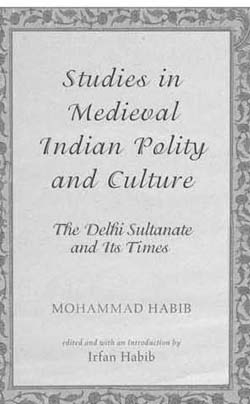The work under review is a collection of essays written by one of the well known historians of the Delhi Sultanate, Mohammad Habib. There are eight essays in this collection that deal with the social and cultural transformations in the Sultanate period. Some of these essays have turned out to be quite controversial, and have generated exciting controversies among historians. The essays ‘Sultan Mahmud of Ghaznin’ and ‘Chishti Mystic Records of the Sultanate Period’ have, for instance, been endlessly debated among historians, and we have still not heard the last word on the controversies that surround them. While many of the formulations of Habib relating to the political and social changes in the Sultanate period may appear dated today, they did, at the time of their publication, serve to enable a paradigm shift in the historiography of the period. (e.g., see the article in the volume titled Some Aspects of the Foundation of the Delhi Sultanate (pp. 203–227).
Mohammad Habib was a staunch nationalist and was actively involved in the Indian National Movement. His academic work reflected his political commitment and influenced his approach to the history of the period. He strongly believed in the composite culture of India and a significant part of his aim of writing was to combat the prejudices in the imperialist historiography. He firmly believed that in representing the Medieval period as divisive and conflict-ridden, the imperialist historians were deliberately distorting the history of the period. To counter the imperialist representation of the period, he persistently emphasized the historical role of the Sufis in India in creating a culture of tolerance, accommodation and appreciation of difference. e.g., see, ‘Hazrat Amir Khusrau of Delhi’ and ‘Shaikh Nasiruddin Mahmud of Delhi as a Historical Personality’. Mohammad Habib flirted with Marxist historiography as well, and sought to explain the processes of social change in terms of forces of production and class inequalities. At the same time, he remained a reluctant Marxist, and his work shied away from the orthodox Marxist approaches; Habib could appreciate the role of cultural factors in causing social change, and he did not ever seek to subsume culture within an overwhelming material base.

